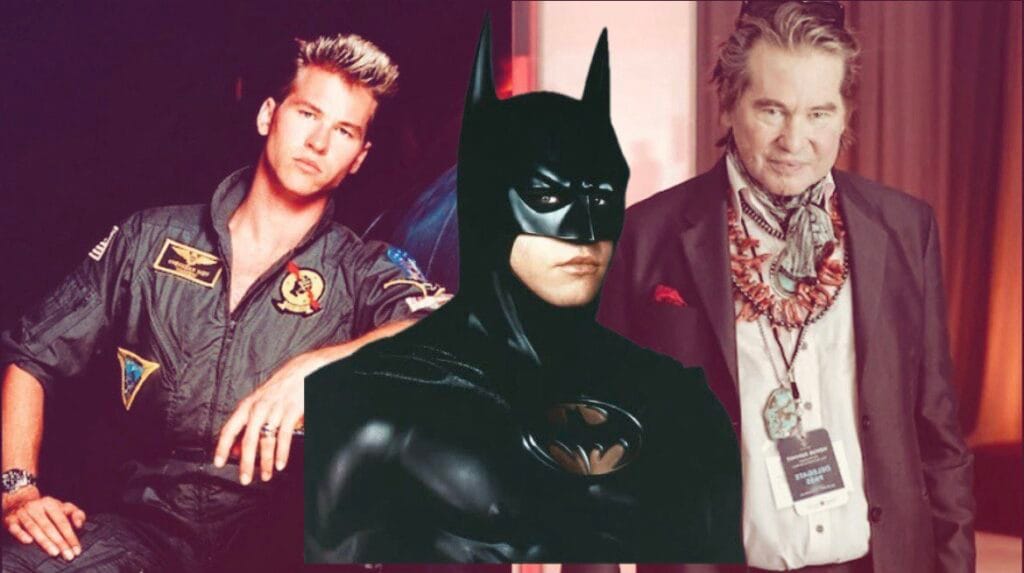
Val Kilmer, the actor whose chameleon-like talent defined roles such as Iceman in Top Gun and Doc Holliday in Tombstone, passed away on April 1, 2025, at his Los Angeles home. He was 65. His family confirmed that pneumonia, compounded by complications from a decade-long battle with throat cancer, led to his death. Kilmer had been scheduled to attend the Beverly Hills Film Festival that evening to support friend Michael Madsen, but his final hours were spent surrounded by loved ones.
A Boy from Los Angeles: Roots of a Hollywood Dreamer
Val Edward Kilmer entered the world on New Year’s Eve, 1959, in Los Angeles, a city that would later become both his playground and his battleground. His mother, Gladys, a homemaker with a quiet strength, and his father, Eugene, a man of Cherokee and Irish grit, split when Val was just nine. The divorce sent him, his father, and his two brothers to a dusty ranch in New Mexico—a place once owned by Roy Rogers, the singing cowboy. Val would later joke that the ghosts of old Hollywood lingered there, whispering stories to him under the desert stars.
But childhood wasn’t all campfires and wide-open skies. In 1977, when Val was 17, his younger brother Wesley, a bright-eyed kid obsessed with making movies, drowned in a jacuzzi during an epileptic seizure. Val packed his grief into a suitcase and boarded a plane to New York the day after the funeral. At Juilliard, he became the youngest student ever admitted to the Drama Division. “I didn’t know how to mourn,” he’d confess decades later. “So I acted. I became other people to escape myself.”
Breaking In: The Rebel with a Cause
Val’s early career was a dance between defiance and destiny. While classmates like Kevin Bacon chased fame, Val turned down Hollywood’s golden tickets. When Francis Ford Coppola offered him a role in The Outsiders (1983), he said no—opting instead for Shakespearean theater. “I wanted to feel the words, not just say them,” he shrugged. But by 1984, he caved, starring in Top Secret!, a spy spoof where he played a rock-star-turned-secret-agent. The role was pure chaos: he sang, he karate-kicked, and even released a cheesy ’80s album as his character, Nick Rivers. Critics called it “ridiculous.” Audiences loved it.
Then came Top Gun (1986). Val didn’t want to play Iceman—the script felt “shallow,” he griped. But when Tom Cruise’s Maverick smirked, Val’s Iceman smirked colder. Their rivalry crackled, and suddenly, Val was a star. He hated it. “Fame felt like a costume I couldn’t take off,” he said. Off-screen, he fell hard for co-star Joanne Whalley on the set of Willow (1988). They married in a whirlwind—and divorced eight years later. “Love in Hollywood is like a mirage,” he mused. “You chase it, but it’s never really there.”
Becoming Legends: The Price of Genius
Val didn’t act—he possessed. For The Doors (1991), he didn’t just play Jim Morrison; he became him. He wore Morrison’s leather pants, chain-smoked, and wandered Sunset Strip like a ghost for a year. He sang every note himself, his voice so eerily perfect that The Doors’ Ray Manzarek once burst into tears during filming. “Val didn’t imitate Jim,” Manzarek said. “He channeled him.” But the role left Val shattered. “I didn’t know where Morrison ended and I began,” he admitted.
Then came Tombstone (1993). As Doc Holliday, the tubercular gunslinger with a wit sharper than his pistol, Val stole the film. He drank whiskey between takes to mimic Holliday’s cough and slept on ice packs to shiver authentically. When Kurt Russell’s Wyatt Earp asked, “You retired too?” Val improvised the line that defined his career: “I’m your huckleberry.” The role should’ve won him an Oscar. Instead, he got rumors of being “difficult.” On Batman Forever (1995), he clashed with director Joel Schumacher over the suffocating Batsuit. “You try acting with your face glued to rubber,” he snapped. The studio labeled him “uncooperative.” Val didn’t care. “I’d rather be honest than polite.”
Flames and Fading Lights: The Unseen Hollywood Battles
The late ’90s tested Val’s resilience. *The Island of Dr. Moreau* (1996) became a circus—Marlon Brando showed up in an ice bucket hat and Val butted heads with director John Frankenheimer. “It was a disaster,” he laughed later. “But disasters make the best stories.” His 2005 comeback in Kiss Kiss Bang Bang reignited his spark, pairing him with a pre-Iron Man Robert Downey Jr. Their banter was electric, but Hollywood had moved on.
Then, in 2014, his voice vanished. Throat cancer, diagnosed late, left him with a tracheotomy scar and a raspy whisper. He hid it for years, ashamed. “My voice was my instrument,” he said. “Losing it felt like losing my soul.” But Val fought—writing memoirs, painting vivid canvases, and directing a documentary, Val (2021), stitching together decades of home videos. In one clip, a young Val films himself, grinning: “Someday, I’ll show this to the world.”
The Last Curtain Call: A Legacy of Fire
Val’s final act was poetic. In Top Gun: Maverick (2022), he reunited with Tom Cruise as Iceman, now a frail admiral. AI recreated Val’s voice, a digital echo of his prime. The scene where Iceman embraces Maverick wasn’t just acting—it was goodbye. “That hug was real,” Cruise said. “We both knew it.”
On April 1, 2025, pneumonia claimed Val at 65. His daughter Mercedes shared his last words: “Tell them I loved wildly.” Tributes poured in: Cher called him “a beautiful mess,” and Josh Brolin said, “He burned too bright for this world.”
Val Kilmer never fit Hollywood’s mold. He was a poet in a blockbuster world, a man who chose art over applause. In his memoir, he wrote: “I’ve been a saint, a sinner, a hero, a fool. But I never faked it.” And that, perhaps, was his greatest role.



